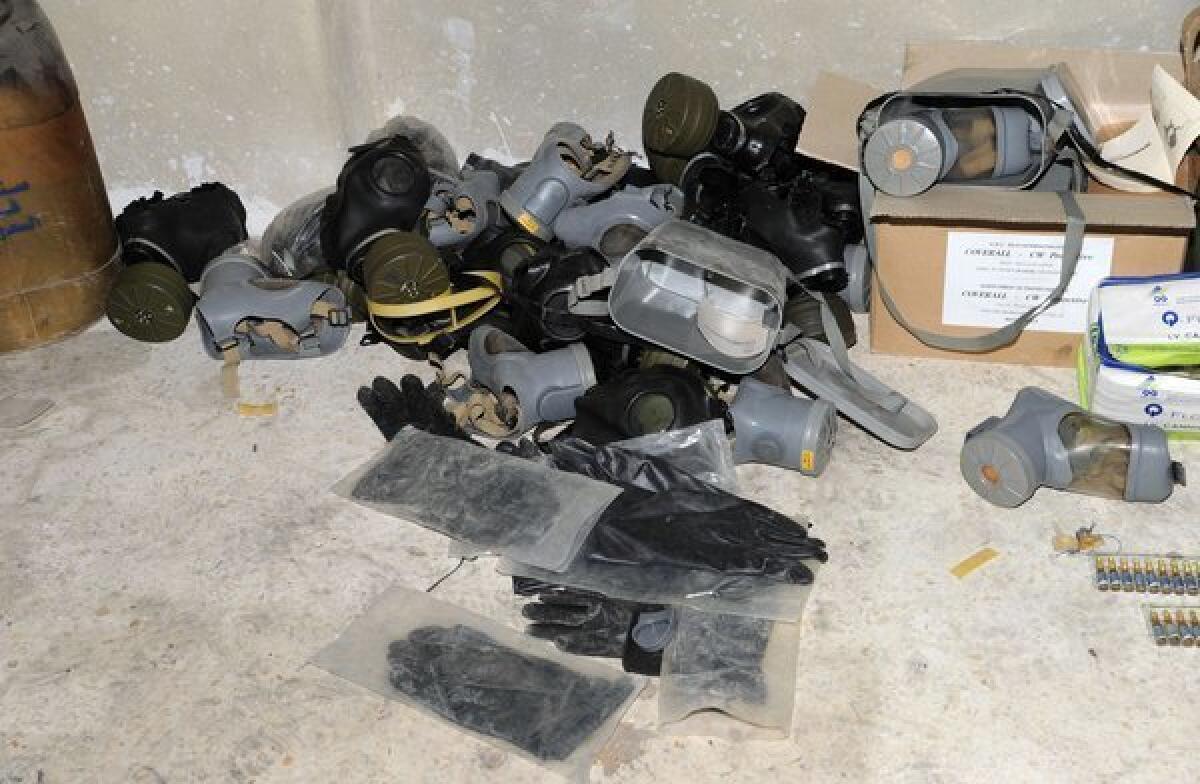Syria accuses rebels of having ‘chemical agents’

- Share via
BEIRUT -- Three days after an alleged chemical attack purportedly killed hundreds of civilians, Syria’s state media reported Saturday that government troops had discovered “chemical agents” in a rebel stronghold northeast of Damascus.
State TV said the toxic substances were found in tunnels in the heavily contested Damascus suburb of Jobar, which has long been the site of combat between government and rebel forces.
An unspecified number of soldiers suffered from “suffocation” and some were hospitalized in critical condition, said the official Syrian Arab News Agency. It was not immediately clear how the soldiers were said to have been exposed.
On Wednesday, opposition activists accused the government of a poison-gas attack on several districts outside Damascus, killing hundreds of people in what they termed a “chemical massacre.” The government has denied the allegations.
Several of the areas allegedly affected in Wednesday’s reported attacks are close to Jobar, along the northeast limits of the capital. The area northeast of Damascus has long been a rebel bastion.
In Jobar, the state media said, soldiers discovered barrels of apparent chemical agents, along with a “large number” of protective masks. State TV showed images of what appeared to be a storeroom with barrels and other items. Official accounts spoke of the agents being found in tunnels and a warehouse.
The official media said the army pushed into the zone after “violent clashes” with “terrorist groups,” the standard government term for rebels.
The reports came Saturday as the United Nations’ top disarmament official, Angela Kane, arrived in Damascus in a bid to convince the Syrian government to allow U.N. access to the sites of Wednesday’s alleged attacks. The U.N. is pushing to expand the mandate of a scientific team already on the ground in Damascus.
The 20-member U.N. contingent was initially assigned to look into three alleged chemical attacks that occurred months ago in various parts of Syria. The world body now seeks to expand its brief to enable the experts to investigate the latest allegations.
Video images of dead children and other purported victims of Wednesday’s alleged attacks have spurred global outrage and demands for an independent international inquiry. Experts have said the images are inconclusive but could indicate that a nerve agent was unleashed.
The United States and Russia are among the many nations that have urged Syria to grant the U.N. team expanded access. Washington backs the Syrian opposition, while Moscow is a major supporter of the government of President Bashar Assad.
U.S. allies Britain and France have said it was likely that the Syrian government carried out Wednesday’s alleged attacks. But Russia has contended that it was the opposition that deployed chemical agents in an effort to discredit the government and trigger international intervention in the more than two-year civil war.
The U.S. military is reportedly aligning naval forces in the Mediterranean in readiness for a possible decision by President Obama to order military strikes on Syrian targets. A year ago, Obama warned that the use of chemical weapons was a “red line” that could trigger a U.S. response. He reportedly was meeting Saturday with key advisers in Washington to discuss U.S. options in the Syrian conflict.
In a separate development on Saturday, Doctors Without Borders, the humanitarian group, said three hospitals in the Damascus area had reported receiving some 3,600 patients early Wednesday “displaying neurotoxic symptoms,” including convulsions, blurred vision and respiratory distress. Of those patients, 365 were reported to have died, the group said.
Doctors Without Borders cautioned that it could “neither scientifically confirm the cause of these symptoms nor establish who is responsible for the attack.” But the circumstances “strongly indicate” exposure to a “neurotoxic agent,” the group said in a press release.
ALSO:
Bo Xilai trial transcripts expose a privileged world of wealth
Morsi backers hold smaller protests in Egypt after crackdown
Thousands of protesting teachers bring chaos to Mexico’s capital
Twitter: @mcdneville
More to Read
Sign up for Essential California
The most important California stories and recommendations in your inbox every morning.
You may occasionally receive promotional content from the Los Angeles Times.













